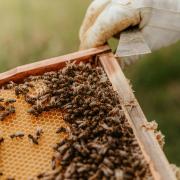
On the eve of the announcement of the Winner of the Man Booker Prize on Sunday, the Southbank Centre in London held readings of each of the short-listed books by their respective authors. The hall was packed full of literacy lovers to hear speak some beloved authors, but also some newer faces. Natalie Hayes, who organised proceedings with a real warmth, almost as if she too was excited to be there, chaired the event.
The first author to take the stage was Margaret Attwood, who has received legend status, since the publication of her now iconic book The Handmaid’s Tale, which was followed by an equally successful TV Show of the same name. Without doubt, current political events have heightened the interest in her new book The Testaments, which deals with the fall of Gileadean society. Attwood read the beginning of her novel, written in the perspective of Aunt Lydia – a poignant character for fans of the original novel. In conversation with Hayes, Attwood explained how she had begun to feel as if the world was becoming more “Gileadic” thus causing her to feel “it needed to be revisited”. Her focus on this second instalment was instead on how a totalitarian regime ends. She stated how her novels were about totalitarianism and thus not a men vs. women type of conflict.
The second author to take the stage was the lesser-known Lucy Ellman with her novel Ducks, Newburyport. She proceeded to read an extract containing a humorous monologue of a mother worried about her son’s consumption of pornography. This novel, containing 1000 pages, is written in one long sentence so that the reader can peer into the mind of a housewife. Much like Attwood, Ellman’s novel touches on the worries of the contemporary American citizen and explores the idea of the loss of the American dream – or whether or not it existed in the first place. Hayes was quick to point out the significance of the exploration of the thoughts and feelings of a woman, to which Ellman humorously replied, “I think it’s time for men to shut up.”
Bernadine Evaristo’s novel Girl, Woman, Other has 12 main characters and she read an extract concerning one: a business worker and her issues with her identity. Powerfully written and read, it explored themes of sexism and racism amongst Black British women, which she argued are so rarely represented in literature.
Chigozie Obiama was the next author to take the stage. The shortlisted An Orchestra of Minorities is only his second book and already his second Man Booker Prize nomination. Narrated by a spirit, he novel was described as a love story, a journey and a coming of age story. It is safe to say that with all this success, he is definitely one to watch in the future.
Salman Rushdie, who is perhaps most known for the controversy surrounding his 1988 novel The Satanic Verses, was next. His reading of his shortlisted novel Quichotte perhaps failed to capture the imagination and feeling of the other before him, but followed similar themes of the previous authors: a critique of American society and the pursuit of truth. Interestingly, he spoke about fiction’s use as a truth-bearer in a post-truth world.
The final author was Elif Shafak, a Turkish-British author, whose novel 10 Minutes and 38 Seconds is set in Istanbul, what she calls a she-city, and captures the final thoughts of a woman before death. Her inspiration for the novel was medical studies she had read, which indicate that the brain is still active for a period after death. The novel deals with a sex worker and explores the East meets West nature of Istanbul, exploring its stories and history. On the subject of her writing rituals, Shafak claimed that listening to heavy metal was a habit of her writing novels as “she hates silence”.
The audience questions provided more interesting insights into the minds of these authors, but perhaps the most insightful was a question on how novels could create societal change. Attwood explained how she believed that novels were the best way to let people understand what it is like to be someone else and therefore creates an empathy with other people that no other art form can.
On Monday night, the winners were announced and for the first time the Man Booker Prize was shared between two authors: Margaret Attwood and Bernadine Evaristo. Attwood became the oldest winner ever and Evaristo became the first black woman to win. Though this ending did cause slight controversy, it is safe that say that any winner would have been a worthy one.



























